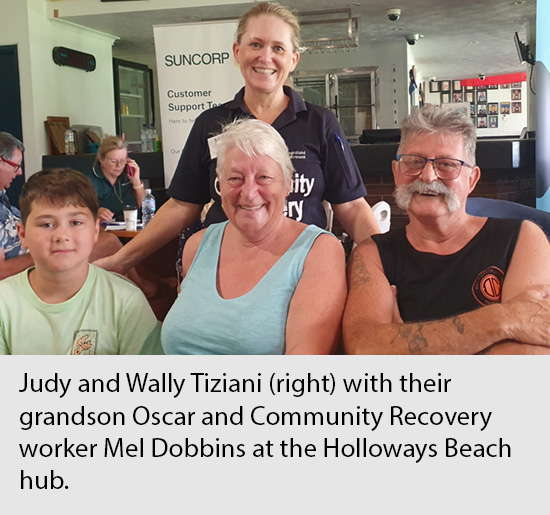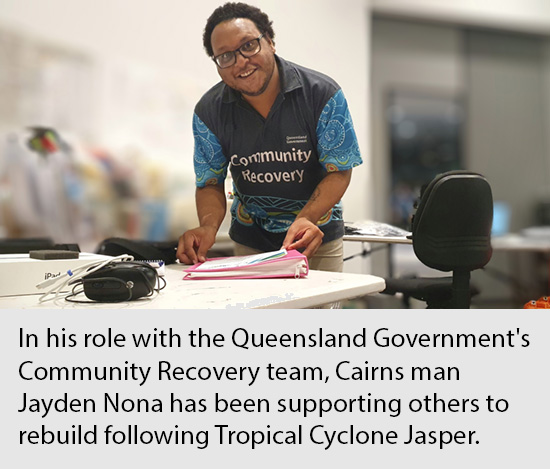Media releases
Far North Queenslanders supported to rebuild after Tropical Cyclone Jasper Posted: Tuesday 6 February 2024
Far North Queenslanders impacted by Tropical Cyclone Jasper are encouraged to apply for personal hardship assistance, with non-income tested grants closing on Wednesday.
In January, the Queensland Government extended the grants deadline by a month in recognition of the scale of the disaster and widespread impacts on communities.
Eligible residents in all nine disaster-declared local government areas have until midnight on Wednesday 7 February 2024 to apply for two non-income tested grants:
- Emergency Hardship Assistance – $180 per person, up to $900 for a family of five or more, to support immediate essential needs, such as food, clothing or medical supplies.
- Essential Services Hardship Assistance – $150 per person, up to $750 for a family of five or more, to assist with immediate needs following the loss of essential services at home for more than five consecutive days.
Other income-tested grants are available, with applications open until December 2025:
- Essential Household Contents Grant – up to $1,765 for individuals and up to $5,300 for couples or families to replace destroyed essential household contents, such as bed linen and white goods.
- Essential Services Safety and Reconnection Scheme Grant – up to $5,000 per household to help uninsured residents reconnect damaged services like electricity, gas and water.
- Structural Assistance Grant – up to $50,000 for uninsured owner-occupiers towards the repair or replacement of a disaster-damaged dwelling to return it to a safe and habitable condition.
This financial support is provided through the jointly funded Commonwealth-State Disaster Recovery Funding Arrangements (DRFA).
People can apply for personal hardship assistance grants online at www.qld.gov.au/disasterhelp.
The Community Recovery Hotline (1800 173 349) is also open 24 hours a day, seven days a week for people to get information, support and assistance with grant applications.
Information about disaster support and recovery for culturally and linguistically diverse people is available in a range of languages at www.qld.gov.au/community/disasters-emergencies/disasters/resources-translations/disaster-information-language.
Impacted residents can also access emotional support or someone to talk to by calling Lifeline on 1800 116 671 from 8am to 8pm daily. After hours support is available by phoning Lifeline on 13 11 14.
Tropical Cyclone Jasper: Eligible Local Government Areas (LGAs)
Financial assistance is available for people who were affected by this event in these areas:
- Cairns Regional
- Cassowary Coast Regional
- Cook Shire
- Douglas Shire
- Hope Vale Aboriginal Shire
- Mareeba Shire
- Tablelands Regional
- Wujal Wujal Aboriginal Shire
- Yarrabah Aboriginal Shire.
[ENDS]
Media contact: media@dsdsatsip.qld.gov.au
Related stories
 Financial and emotional support helps Holloways Beach couple recover
Financial and emotional support helps Holloways Beach couple recover
When Judy Tiziani returned to her flood-ravaged home in Holloways Beach, she thought she’d face the clean-up with stoicism and a stiff upper lip.
But she soon discovered the disaster’s impacts were not just physical.
“I didn’t realise how much it would affect me mentally,” she said.
“I thought I’d just roll up my sleeves and start cleaning, and everything would be fine. But instead, I couldn’t stop crying.”
While Judy and her husband Wally consider themselves lucky that their home remains habitable, water ingress and no power soon meant that mould rendered it a health risk.
“I knew I needed help, but I wasn’t sure where to turn. Then a friend told me about the Community Recovery Hubs,” she said.
Judy and Wally headed to the Holloways Beach hub, where Community Recovery worker Mel Dobbins helped the couple apply for an Emergency Hardship Assistance (EHA) grant.
One of a range of personal hardship assistance grants jointly funded by the Queensland and Australian governments, the EHA can help people meet their immediate essential needs following a disaster, with $180 per person and up to $900 for a family of five or more.
“It was a big relief,” said Judy. “We lost everything in our fridge and freezer of course, but I had no idea that this kind of help was available. It’s good to be able to get food on the table.”
The Community Recovery team was also able to connect the couple with other organisations for cleaning assistance and emotional support.
“I needed someone to talk to, and that’s what I got,” said Judy. “Mel introduced me to a lovely lady from the Salvos, and after a cup of tea and a good chat, I started feeling myself again.”
If you need emotional support or someone to talk to, call Lifeline on 1800 116 671 from 8am to 8pm daily. After hours support is available by phoning Lifeline on 13 11 14.
 “I couldn’t just stand by and watch my community struggle”
“I couldn’t just stand by and watch my community struggle”
In the aftermath of the devastating floods that ex-Tropical Cyclone Jasper brought to Far North Queensland, locals like Jayden Nona have emerged as shining lights for their communities.
While his ancestral homeland is Badu Island in the Torres Strait, Mr Nona was born and raised in Cairns.
When he was given the chance to take on the crucial role of Community Recovery worker with the Queensland Government following the natural disaster, he didn’t hesitate.
“I couldn’t just stand by and watch my community struggle,” said Mr Nona, whose passion for community service is deeply rooted in his Torres Strait Islander heritage.
“It’s our responsibility to help each other in times of need. I love working directly with people, particularly Indigenous people, and this role has allowed me to do that in a meaningful way.”
Mr Nona’s role as a Community Recovery worker extends beyond physical and financial rebuilding; he also focuses on helping people affected by the disaster get the emotional support they need from partner organisations such as Lifeline and The Salvation Army.
Like dozens of other locals who joined the Queensland Government’s efforts to rebuild and restore their communities, Mr Nona feels a genuine sense of fulfillment from seeing the results of his and his teammates’ efforts.
“We did an outreach from Cairns, and there was a guy who wanted to give up on everything,” he said. “He just thought nobody would care about him.”
With the support of Community Recovery, the man was able to get the help he needed to begin to rebuild.
“From getting him food and the healthcare he needed, to washing his clothes and helping him find someone to repair his van. He was so grateful,” said Mr Nona.
Mr Nona acknowledged that disaster recovery was often a long road and for many, that journey was just beginning.
“Together, we will rebuild, and our resilience will define the strength of all the Far North,” he said. “That’s just who we are.”
Free counselling and support are available through a dedicated Lifeline support line to assist Far North Queenslanders to recover from Tropical Cyclone Jasper.
If you need emotional support or someone to talk to, call Lifeline on 1800 116 671 from 8am to 8pm daily. After hours support is available by phoning Lifeline on 13 11 14.
- Last reviewed
- 5 July 2022
- Last modified
- 23 February 2024
 This work is licensed under a Creative Commons Attribution 4.0 International (CC BY 4.0) licence
This work is licensed under a Creative Commons Attribution 4.0 International (CC BY 4.0) licence

